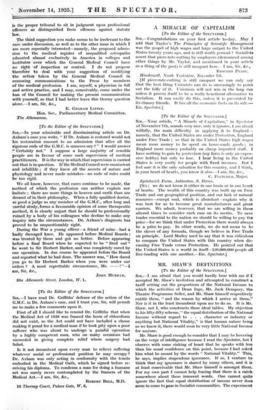[To the Editor of the SPECTATOR.]
Sut,—In your admirable and discriminating article on Dr. Axham's case you write, "If Dr. Axham is restored would not his restoration amount to an admission that after all the rigorous code of the G.M.C. is unnecessary ? " I would answer ." Certainly hot." I suppose a large majority of sensible people are in favour of some such supervision of medical practitioners. It is the *ay in which that supervision is carried Out that is in question. If the Medical Council were Omniscient and infallible; if they knew all the secrets of nature and physiology and never made mistakes—no code of rules could
be tor) rigid. •
We all know, however, that cures continue to be made, the method of which the profession can neither explain nor imitate ; there are more things in heaven and earth than are dreamt of in their philosophy.' When a fully qualified doctor, is good a indge as any' meinber of the G.M.C., after long and careful study, forms a favourable opinion of some therapeutic method, it is clearly unjust that he should be professionally ruined by a body of his colleagues who decline to Make any inquiry into the circumstances. Dr. Axham's diagnosis haS proved to be unquestionably right.
During the War a young officer—a friend of mine—had a hadly damaged knee. He appeared before Medical Boards ; Was 'treated by them and got no better. Before appearing before a final Board when he expected to be "fired out" he went to Sir Herbert Barker, and was completely cured by one operation. In due course he appeared before the Board and reported what he had done. The answer was, "How dared you go to Sir Herbert Barker when you were under our orders ? A most regrettable circumstance, Mr. --- !"—i am, Sir, &c.,
" Jornq MURRAY, 50a Albemarle Street, London, W.1.


























































 Previous page
Previous page